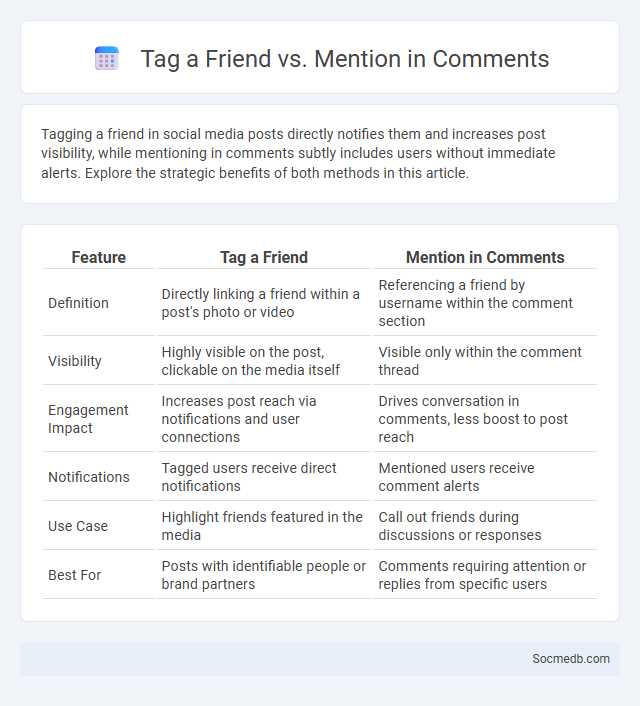
Photo illustration: Tag a Friend vs Mention in Comments
Tagging a friend in social media posts directly notifies them and increases post visibility, while mentioning in comments subtly includes users without immediate alerts. Explore the strategic benefits of both methods in this article.
Table of Comparison
| Feature | Tag a Friend | Mention in Comments |
|---|---|---|
| Definition | Directly linking a friend within a post's photo or video | Referencing a friend by username within the comment section |
| Visibility | Highly visible on the post, clickable on the media itself | Visible only within the comment thread |
| Engagement Impact | Increases post reach via notifications and user connections | Drives conversation in comments, less boost to post reach |
| Notifications | Tagged users receive direct notifications | Mentioned users receive comment alerts |
| Use Case | Highlight friends featured in the media | Call out friends during discussions or responses |
| Best For | Posts with identifiable people or brand partners | Comments requiring attention or replies from specific users |
Understanding Tagging a Friend on Social Media
Tagging a friend on social media involves linking their profile to a specific post, photo, or comment, allowing them to be notified and easily identified by others. You can enhance engagement by tagging friends relevant to the content, increasing visibility within your network and fostering interaction. Proper tagging is essential for maintaining privacy settings and ensuring your connections are accurately represented in online conversations.
What Does Mentioning in Comments Mean?
Mentioning in comments on social media involves tagging or referencing another user by including their username, which notifies them of the interaction and increases engagement. This practice enhances visibility for both parties by drawing attention to specific conversations and fostering community interaction. It also helps in building network connections and promoting content through amplified reach across users' social graphs.
Defining Call to Action in Digital Content
A Call to Action (CTA) in digital content directs users to take a specific step such as subscribing, purchasing, or sharing, driving engagement and conversions. Effective CTAs use clear, concise language combined with compelling design elements like buttons or links to grab attention. Metrics like click-through rates and conversion rates are crucial for measuring CTA effectiveness on social media platforms such as Facebook, Instagram, and LinkedIn.
Key Differences: Tagging vs Mentioning vs Calling to Action
Tagging on social media involves directly linking a user's profile to content, enhancing visibility and engagement by notifying the tagged individual or brand. Mentioning refers to referencing someone's username within a post or comment without linking directly to their profile, often used to acknowledge or highlight them subtly. Calling to action (CTA) prompts users to take specific actions like liking, sharing, or commenting, driving interaction and increasing content reach strategically.
When to Tag Friends for Maximum Engagement
Tagging friends on social media yields maximum engagement when content is highly relevant to their interests or experiences, ensuring authentic interaction. Optimal timing occurs during peak user activity hours, typically mid-morning and early evening on weekdays, to increase visibility. Strategic tagging around trending topics or shared memories further amplifies reach and interaction rates.
Strategic Uses of Mentions in Social Platforms
Mentions on social media platforms strategically enhance engagement by directly involving your audience and key influencers, boosting visibility and fostering authentic interactions. Leveraging mentions in comments or posts can drive conversations, increase brand awareness, and create opportunities for collaboration and network growth. Effective use of mentions also helps monitor brand reputation and respond promptly to customer feedback, strengthening your online presence and community trust.
Effective Call to Action Techniques that Convert
Effective call to action techniques that convert on social media include using clear, direct language that tells your audience exactly what you want them to do, such as "Subscribe Now" or "Shop Today." Incorporating urgency with limited-time offers or exclusive deals encourages immediate engagement, boosting your conversion rates. You can enhance results further by pairing CTAs with compelling visuals and consistent branding to capture attention and build trust.
Social Media Algorithms: How Tags, Mentions, and CTAs Impact Reach
Social media algorithms prioritize content based on engagement metrics, with tags and mentions significantly increasing visibility by linking posts to broader conversations and influential profiles. Strategic use of hashtags categorizes content for targeted audiences, enhancing reach within specific interest groups and maximizing algorithmic recommendations. Clear and compelling calls-to-action (CTAs) drive interactions such as likes, comments, and shares, which algorithms interpret as signals of content relevance, thereby boosting organic distribution and overall engagement.
Best Practices for Tagging, Mentioning, and Calls to Action
Effective social media strategies involve tagging relevant accounts to increase visibility and engaging your audience through well-crafted mentions that encourage interaction. Using clear and concise calls to action (CTAs) can drive desired responses such as clicks, shares, or comments, enhancing your content's reach and engagement metrics. Optimize your posts by incorporating hashtags, tagging influencers or partners, and including compelling CTAs tailored to your audience's interests.
Choosing the Right Engagement Method for Your Goals
Selecting the right social media engagement method depends heavily on your specific marketing objectives, whether building brand awareness, driving website traffic, or increasing conversion rates. Interactive content such as polls, quizzes, and live videos often yields higher user participation and fosters genuine connections. Tailoring your approach to match platform demographics and user behavior enhances Your ability to achieve measurable results and optimize return on investment.
 socmedb.com
socmedb.com